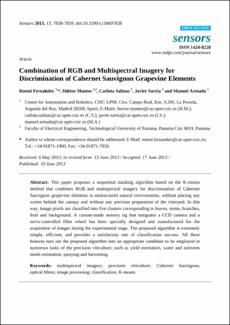El sistema se apagará debido a tareas habituales de mantenimiento. Por favor, guarde su trabajo y desconéctese.
Combination of RGB and Multispectral Imagery for Discrimination of Cabernet Sauvignon Grapevine Elements
| dc.contributor.author | Fernández, Roemi | |
| dc.contributor.author | Montes Franceschi, Héctor | |
| dc.contributor.author | Salinas, Carlota | |
| dc.contributor.author | Sarria, Javier | |
| dc.contributor.author | Armada, Manuel | |
| dc.date.accessioned | 2017-07-31T16:00:04Z | |
| dc.date.accessioned | 2017-07-31T16:00:04Z | |
| dc.date.available | 2017-07-31T16:00:04Z | |
| dc.date.available | 2017-07-31T16:00:04Z | |
| dc.date.issued | 2013-06-19 | |
| dc.date.issued | 2013-06-19 | |
| dc.identifier | http://www.mdpi.com/1424-8220/13/6/7838 | |
| dc.identifier.uri | http://ridda2.utp.ac.pa/handle/123456789/2363 | |
| dc.identifier.uri | http://ridda2.utp.ac.pa/handle/123456789/2363 | |
| dc.description | This paper proposes a sequential masking algorithm based on the K-means method that combines RGB and multispectral imagery for discrimination of Cabernet Sauvignon grapevine elements in unstructured natural environments, without placing any screen behind the canopy and without any previous preparation of the vineyard. In this way, image pixels are classified into five clusters corresponding to leaves, stems, branches, fruit and background. A custom-made sensory rig that integrates a CCD camera and a servo-controlled filter wheel has been specially designed and manufactured for the acquisition of images during the experimental stage. The proposed algorithm is extremely simple, efficient, and provides a satisfactory rate of classification success. All these features turn out the proposed algorithm into an appropriate candidate to be employed in numerous tasks of the precision viticulture, such as yield estimation, water and nutrients needs estimation, spraying and harvesting. | en_US |
| dc.description.abstract | This paper proposes a sequential masking algorithm based on the K-means method that combines RGB and multispectral imagery for discrimination of Cabernet Sauvignon grapevine elements in unstructured natural environments, without placing any screen behind the canopy and without any previous preparation of the vineyard. In this way, image pixels are classified into five clusters corresponding to leaves, stems, branches, fruit and background. A custom-made sensory rig that integrates a CCD camera and a servo-controlled filter wheel has been specially designed and manufactured for the acquisition of images during the experimental stage. The proposed algorithm is extremely simple, efficient, and provides a satisfactory rate of classification success. All these features turn out the proposed algorithm into an appropriate candidate to be employed in numerous tasks of the precision viticulture, such as yield estimation, water and nutrients needs estimation, spraying and harvesting. | en_US |
| dc.language | eng | |
| dc.language.iso | eng | en_US |
| dc.rights | https://creativecommons.org/licenses/by-nc-sa/4.0/ | |
| dc.rights | info:eu-repo/semantics/openAccess | |
| dc.subject | multispectral imagery | en_US |
| dc.subject | precision viticulture | en_US |
| dc.subject | Cabernet Sauvignon | en_US |
| dc.subject | optical filters | en_US |
| dc.subject | image processing | en_US |
| dc.subject | classification | en_US |
| dc.subject | K-means | en_US |
| dc.subject | multispectral imagery | |
| dc.subject | precision viticulture | |
| dc.subject | Cabernet Sauvignon | |
| dc.subject | optical filters | |
| dc.subject | image processing | |
| dc.subject | classification | |
| dc.subject | K-means | |
| dc.title | Combination of RGB and Multispectral Imagery for Discrimination of Cabernet Sauvignon Grapevine Elements | en_US |
| dc.type | info:eu-repo/semantics/article | |
| dc.type | info:eu-repo/semantics/publishedVersion |
